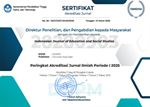Azizah, N., Zahro, F., & Tohet, M. (2025). Assistance in the Use of YouTube Kids as a Creative Learning Resource for Educators and Education Staff. Communautaire: Journal of Community Service, 04(01), 14–24.
Bleukx, N., Denies, K., Van Keer, H., & Aesaert, K. (2025). Teachers' Autonomy Support in Reading: A Multilevel Latent Profile Analysis Approach. Reading Research Quarterly, 60(3), e70015. https://doi.org/10.1002/rrq.70015
Bogaerds-Hazenberg. (2021). A meta-analysis on the effects of text structure instruction on reading comprehension in the upper elementary grades. Reading Research Quarterly. https://doi.org/https://doi.org/10.1002/rrq.311
Bukhori, I., & Zahro, F. (2025). Enhancing Madrasa Teacher Mindfulness through Organizational Culture. Journal of Innovation in Educational and Cultural Research, 6(2), 253–261. https://doi.org/10.46843/jiecr.v6i2.1825
Dadandı, P. U., & Dadandı, İ. (2022). The relationships among teachers’ behaviours that encourage students’ reading engagement, reading enjoyment, reading self-efficacy and reading success. Participatory Educational Research, 9(3), 98-110.
Durante, C. (2025). Foundational Reading Skills: Implementation in Secondary Classrooms (Doctoral dissertation).
International Association for the Evaluation of Educational Achievement (IEA). (2021). Progress in International Reading Literacy Study (PIRLS).
Kim, J. S., Burkhauser, M. A., Mesite, L. M., Asher, C. A., Relyea, J. E., Fitzgerald, J., & Elmore, J. (2021). Improving reading comprehension, science domain knowledge, and reading engagement through a first-grade content literacy intervention. Journal of Educational Psychology, 113(1), 3. https://doi.org/10.1037/edu0000465
Ko, S., & Rossen, S. (2018). Classroom Management and Facilitation. In Teaching Online. https://doi.org/10.4324/9780203427354-11
Li, X., & Chu, S. K. W. (2021). Exploring the effects of gamification pedagogy on children’s reading: A mixed‐method study on academic performance, reading‐related mentality and behaviors, and sustainability. British Journal of Educational Technology, 52(1), 160-178. https://doi.org/10.1111/bjet.13057
McBreen, M., & Savage, R. (2020). The impact of motivational reading instruction on the reading achievement and motivation of students: A systematic review and meta-analysis. Educational Psychology Review. https://doi.org/10.1007/s10648-020-09584-4
Mulatu, E., & Regassa, T. (2022). Teaching reading skills in EFL classes: Practice and procedures teachers use to help learners with low reading skills. Cogent Education, 9(1), 2093493. https://doi.org/10.1080/2331186X.2022.2093493
Naningsih, E., Hidayah, F., Aniati, A., & Baharun, H. (2024). Enhancing Learning Quality: The Role Of Teacher Competence In Madrasah. Jurnal At-Tarbiyat: Jurnal Pendidikan Islam, 7(3).
Nazilah, S. R., Rahman, K., Hidayah, F., Wahyono, I., & Baharun, H. (2024). Promoting Religious Tolerance through Islamic Education: Implementing Moderation Values in the Classroom. PALAPA, 12(2), 120–139. https://doi.org/10.36088/palapa.v12i2.5246
Nguyen, T. L. P. (2022). Teachers’ strategies in teaching reading comprehension. International Journal of Language Instruction, 1(1), 19-28. https://doi.org/10.54855/ijli.22113
Payne, T., Muenks, K., & Aguayo, E. (2023). “Just because I am first gen doesn't mean I’m not asking for help”: A thematic analysis of first-generation college students’ academic help-seeking behaviors. Journal of Diversity in Higher Education, 16(6), 792. https://doi.org/10.1037/dhe0000382
Putri, D. F., Qushwa, F. G., Putri, D. M. S., Widiasari, F., Zahro, F., & Baharun, H. (2024). Behaviour Management in the Classroom: Improving the Quality of Education through Systematic Optimization of the Learning Environment. FALASIFA: Jurnal Studi Keislaman, 15(1), 35–47. https://doi.org/10.62097/falasifa.v15i1.1787
Rozi, F., & Badriyah, N. (2025). Elementary Madrasah Teachers’ Perceptions of the Seamless Learning Model. JETech: Journal of Education and Technology, 1(1), 1–9.
Ryskin, R., & Nieuwland, M. S. (2023). Prediction during language comprehension: what is next?. Trends in Cognitive Sciences, 27(11), 1032-1052. https://doi.org/10.1016/j.tics.2023.08.003
Tavares, M. C., Azevedo, G., Marques, R. P., & Bastos, M. A. (2023). Challenges of education in the accounting profession in the Era 5.0: A systematic review. Cogent Business & Management, 10(2), 2220198. https://doi.org/10.1080/23311975.2023.2220198
Utamimah, S., & Nur Aisyah, E. (2025). Implementing Project-Based Learning with Loose Parts in Early Childhood Education: A Qualitative Descriptive Study. Golden Age: Jurnal Ilmiah Tumbuh Kembang Anak Usia Dini, 10(1), 71–84. https://doi.org/10.14421/jga.2025.101-0
Wang, X., Zhong, Y., Huang, C., & Huang, X. (2024). ChatPRCS: A personalized support system for English reading comprehension based on ChatGPT. IEEE Transactions on Learning Technologies, 17, 1722-1736. https://doi.org/10.1109/TLT.2024.3405747
Yapp, D., de Graaff, R., & van den Bergh, H. (2023). Effects of reading strategy instruction in English as a second language on students’ academic reading comprehension. Language Teaching Research, 27(6), 1456-1479. https://doi.org/10.1177/1362168820985236
Zimmermann, L. M., Reed, D. K., & Aloe, A. M. (2021). A meta-analysis of non-repetitive reading fluency interventions for students with reading difficulties. Remedial and Special Education, 42(2), 78–93. https://doi.org/10.1177/0741932519855058
 (Universitas Klabat)
(Universitas Klabat) 



